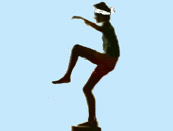The 1984 film The Karate Kid presents a strange, alternate reality where everybody is in some way associated with martial arts, and by extension the eponymous "kid" (portrayed by Ralph Macchio, at the time pushing a very non-kid-like twenty-two). It is a world where karate championships, rather than being ignored by all but their participants, are attended by audiences as fanatical and vocal as any football finals crowd. A world where even the bullies forsake their traditional moves (the collar grab, the king hit, the five-on-one shit-kick) for slick fighting stances and precision hand chops. A ridiculous self-contained Hollywood land founded on head-slappingly stupid plotting, laughable dialogue, and one-dimensional characters.
Yet despite exhibiting all the hallmarks of A-grade free range cinematic bullshit, The Karate Kid had a curious effect on me as a youngster. For a brief time it entranced me quite completely. You have to understand that when it was released I was just five years old - my first viewing of the film probably occurred a year or two later, on video - although this fact doesnt quite stifle the twinge of retroactive shame I feel at having considered Ralph Macchio a role model at all.
For a child, fantasy and reality can easily blur, and having seen The Karate Kid a few times I was convinced that the martial art - with its discipline, tradition, and cool flying roundhouse kicks - was the recreational pursuit for me. Choosing to ignore my obvious sporting ineptitude (a state of denial that would later lead to embarrassing forays into amateur tennis, cricket, and basketball) I signed up at a dojo, had my parents fork over some dosh for a karate-gi, and immediately began to shit myself.

|
| Evil Sensei Guy demonstrates the formidable nose-pick stance. |
The problem was the whole blurring of fantasy and reality mentioned earlier - it just wasnt blurring the right way. Not only did I believe that an under-weight weakling such as myself could become a karate master, just like in the film, I also believed that karate dojos were populated by nasty, muscular arseholes called Johnny, just like in the film, who would taunt and beat me until I went crying home to mummy. In fact, I worked myself up so much before the first lesson worrying about these archetypal goons that I actually did go crying home to mummy. Remember, though, I was extremely young and...uh, I guess thats still kind of embarrassing...
Once I actually made it to a few lessons, I realised that black-belt bullies were a fiction of the movie, and that the only person to fear was the sensei, not because I felt he might beat me, but because I felt he might notice that I couldnt actually touch my toes and snap my spine for the edification of my classmates, or something equally as sadistic. I also realised that I was making very little progress, and this served to shatter any remaining illusions I held about becoming a real-life Daniel Laruso.
In the film, you might recall, young Daniel is taken under the tutelage of Mr Miyagi, a quiet, dignified odd-jobs man who maintains a fleet of classic cars, catches flies with a pair of chopsticks, and knows a thing or two about honour. Through a rigorous program of household chores and trite platitudes, Miyagi teaches Daniel his special brand of karate, including the famous "crane" kick, which first startles the opponent with an amusing, impractical stance, before finishing him with a perfectly executed toe-flick to the lower jaw.

|
| Victory is just a muscle spasm away. |
So when I joined up at the local dojo, I expected to learn all sorts of neat maneuvers. Not the crane kick, necessarily, but I certainly envisioned wading into schoolyard battles with a few incapacitating impersonations of lower creatures. The frog-punch, or the lizard-chop, perhaps. Then there was the wax-on, wax-off defensive technique, the fence-painting throat slam, and the classic balance-on-one-foot-on-the-bow-of-a-row-boat death kick. But none of this was even hinted at in any of the lessons I attended. Instead we did simple punch and kick drills for hours on end, then we counted to ten in Japanese, then we sparred and somebody punched me in the nose and it hurt so I quit.
That was the end of my karate experience, but it wasn't the end of The Karate Kid. By the time I hung up my gi there was a sequel which essentially repeated the plot of the first film (itself a bad photocopy of the same director's earlier film Rocky) merely adding further stereotypes to the mix as the setting shifted to Japan, portraying that long-industrialised country of as a rice paddy backwater full of vendetta fighting and wind chimes. In 1989 there came a third film, in which a bonsai tree out-acted pretty much the entire cast, and some years later an attempt to revive the series was made with The Next Karate Kid, which featured a female "kid". No record survives of what Ralph Macchio thought of that.
As for myself, I never returned to the mirrored-walls of the dojo. Karate just wasn't my thing. And really, I didn't need it anyway. It's not like I had a bully problem, being a manipulative little bastard commanding loyalty from every schoolyard faction, every class dunce hothead, and most of the teachers, too. Yes, I was a real mini-Machiavelli. But that's another story that I haven't the time to embellish at the moment. So, for now, as Daniel Laruso put it in an odd cross-cultural kind of way, adios, Mr Miyagi! |
 |
|
 |
|
 |
|
|

